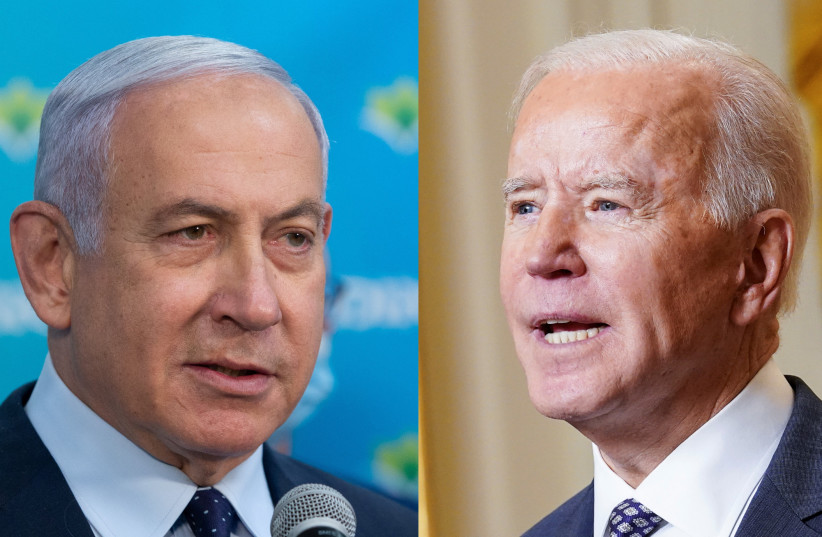US President Joe Biden’s threat to reassess US policy on the Gaza war if Israel does not alter course may or may not impact Arab voters in the swing state of Michigan, endangering Biden’s reelection bid by threatening to stay home on Election Day.
It will, however, register loud and clear in the Arab states in the Gulf that are watching carefully to see not only if Israel can eviscerate an enemy but also whether the US will stand by a long-time, trusted, and close ally.
It is unclear that there is anything Biden may do short of cutting off arms supplies to Israel and joining South Africa in accusing the Jewish state of genocide that will get anti-Israel Arab voters and progressives to vote for him in November.
It is clear, however, that if Saudi Arabia and the other Gulf states perceive that the president is “throwing Israel under the bus,” then they will adjust their strategic calculations accordingly.
Following the tough conversation last Thursday between Biden and Prime Minister Benjamin Netanyahu, the president put out a statement warning that a reassessment of policy regarding the Gaza war might be imminent.
The Prime Minister’s Office, which almost always puts out a readout of a call with US presidents, opted to remain silent this time.

Biden’s stern message was heard loud and clear in Jerusalem. Shortly after that conversation, the security cabinet met and agreed to increase the flow of humanitarian aid into Gaza via the Ashdod Port and the Erez crossing.
The Gulf states also got the message, and for those countries’ rulers, who are keen on cooperation with Israel – as opposed to their publics, who are infuriated by Israel’s actions – the message has to be somewhat troubling: the US is tying the hands of one of its closest allies in a fight against an enemy aligned with Iran, the most malevolent forces in the region.
Do the Arab American voters want a ceasefire?
The Arab voters and the progressives to whom Biden’s change of tone seems to be pandering might want a ceasefire, something that will enable Hamas to survive to fight another day.
However, the leaders of Saudi Arabia, the United Arab Emirates, and Bahrain are uninterested in that outcome. Hamas is aligned with Iran, and Iran is – and remains – their mortal enemy.
Seen through a very narrow lens – the media lens bringing this war to the West – this is a battle between Israel and Hamas in which too many innocent Palestinians and humanitarian workers are being killed.
But if you widen the lens, this is a battle not only between Israel and Hamas but also between the moderate camp in the Middle East and the radical one supported by Iran. If Hamas survives because the US has tied Israel’s hands, then the radical camp is emboldened.
That is a disaster for Israel but also a disaster for others in the moderate camp – Saudi Arabia, the UAE, Bahrain, Egypt, and even Jordan’s King Abdullah – whom Iran and its proxies also threaten.
Israel, as the saying goes, has been to this movie before, when a confrontation with the US administration placed it and the moderate Arab camp on the same side. That “movie” played in 2015, at the height of the tension between Washington and Jerusalem over the Iranian nuclear deal.
In March of that year, Netanyahu delivered a speech in Congress that was viewed by many as blatant interference in US domestic politics and soured relations between the prime minister and leading Democratic politicians for years.
BUT RON DERMER, today the strategic affairs minister who at the time was ambassador to Washington and the architect of that speech, said in an interview with Mishpacha magazine in December 2020 that Netanyahu’s speech to Congress was critical in forging relations with the moderate Arab countries that culminated in the signing of the Abraham Accords five years later.
“Without that speech, I doubt we’d have peace deals with the Arab states today,” he said.
Dermer said this speech significantly raised Israel’s stature in the eyes of the Arab states since they realized that if Israel’s premier was willing “to stand up for what he believes in,” even if it meant a frontal confrontation with the United States president, then Israel was no American “vassal state,” but rather an “independent force” that could be relied upon.
“I can tell you as a fact that the speech dramatically accelerated contacts beneath the surface between Israel and many Arab states,” Dermer said, adding that when the Arab countries saw Israel leading the charge against the Iranian nuclear deal – even against then-president Barack Obama’s wishes – they concluded that it was a country with whom it was worth forging a strong partnership.
Those same states are carefully watching both Israel and the US today. They are watching the Jewish state to see whether it has the wherewithal and staying power to defeat Hamas because if Israel can’t decisively defeat Hamas, what good would an alliance with it be that aims to prevent an Iranian takeover of the region?
And they are watching America to see whether the administration – because of a concern about domestic US politics and the progressive wing of the Democratic Party – will ditch an ally in its time of need.
Following Biden’s conversation with Netanyahu, Republican Speaker of the House Mike Johnson posted on X that the president’s ultimatums should be going to Hamas, not Israel.
“Biden should not undercut our ally amidst an existential threat by conditioning our support,” he wrote.
America’s other allies in the region are undoubtedly watching to see whether the administration is doing just that. In other words, what is good for the Arab voters in Michigan may not be suitable for the Arab governments in countries like the UAE, Bahrain, and Saudi Arabia.
